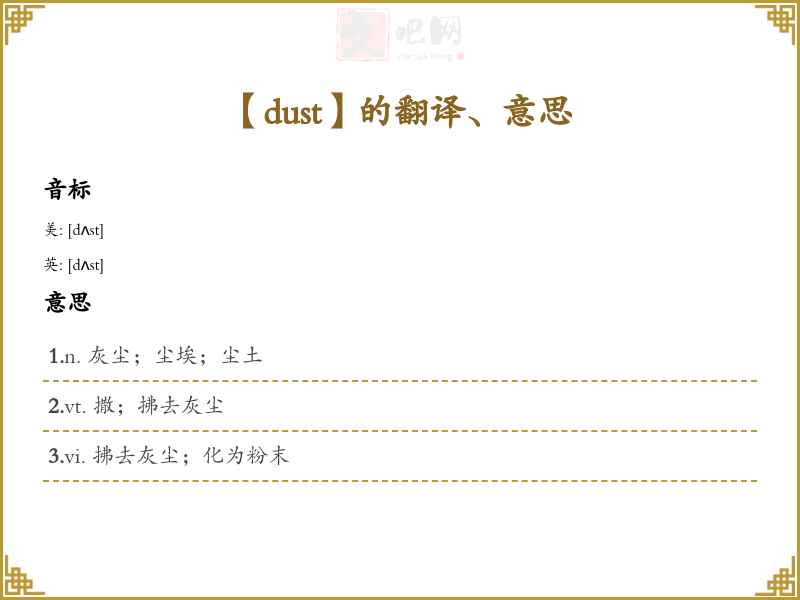【dust】的翻译、意思
时间: 2025-01-11 05:50:39
【dust】怎么读
美:[dʌst]
英:[dʌst]
【dust】是什么意思、字义解释
1. n. 灰尘;尘埃;尘土
2. vt. 撒;拂去灰尘
3. vi. 拂去灰尘;化为粉末
4. n. (Dust)人名;(德、俄)杜斯特
【dust】的详细解释
英文单词学*与分析:[dust]
1. 基本定义:
- 字面意思:Dust 是指微小的固体颗粒,通常由土壤、皮屑、植物碎屑等组成,通常沉积在表面上。
- 定义:Dust is a fine, dry powder that consists of tiny pieces of dirt or other substances.
- 词性:名词和动词。
2. 词源与起源:
-
词源分析:Dust 源于古英语 "dūst",其词根与德语 "Staub" 和荷兰语 "stof" 相关,均表示灰尘或细碎的物质。
-
历史背景:该单词的历史可以追溯到公元前的日耳曼语,首次在文学中出现于《圣经》中的多次引用,表示尘土和死亡的象征。
-
课本:
- **教材:可能出现在小学英语教材中,适合初学者。
- 牛津教材:中学阶段的英语学*书籍。
- 美国教材:英语作文和科学课本中,适合初中和高中生。
3. 使用场景:
-
正式与非正式语境:
- 正式:在科学研究、环境报告中使用,如“Airborne dust can affect respiratory health.”(空气中的灰尘可能影响呼吸健康。)
- 非正式:在日常对话中,如“There's dust everywhere in this room.”(这个房间里到处都是灰尘。)
-
特殊场合:
- 法律:在法律文件中,可能提到“dust”作为证据或物理状态。
- 科学:在地理或环境科学中,讨论“dust storms”对气候的影响。
4. 示例句子:
- The old bookshelf was covered in dust.
- 旧书架上满是灰尘。
- She blew the dust off the antique vase.
- 她把古董花瓶上的灰尘吹掉了。
- Dust particles can carry allergens and pollutants.
- 灰尘颗粒可以携带过敏原和污染物。
- After the construction, the entire area was filled with dust.
- 建设后,整个区域都被灰尘覆盖。
- He felt like he was living in a cloud of dust.
- 他感觉自己生活在一片灰尘云中。 *. The dust settled after the storm.
- 风暴过后,灰尘平静下来。
- Dust is often a sign of neglect in cleaning.
- 灰尘通常是清洁不当的标志。
- The archaeologists discovered dust layers that were thousands of years old.
- 考古学家发现了数千年历史的灰尘层。
- Don't forget to dust the furniture before guests arrive.
- 在客人到来之前,不要忘了给家具除尘。
- The dust from the road made the air unhealthy.
- 道路上的灰尘使空气变得不健康。
5. 同义词与反义词:
-
同义词:Powder, dirt, grime
- 微小差异:虽然都表示细小颗粒,但 "powder" 可能更指细腻的物质,而 "grime" 通常指污垢。
-
反义词:Cleanliness, purity
- 区别:这些词表示没有灰尘或杂质的状态,强调清洁与卫生。
. 学方法:
-
音标记忆法:/dʌst/
- 通过发音重复来加深记忆。例如,将 "dust" 与 "just" 进行联想发音。
-
词根记忆法:将 "dust" 的词根与其他含有相同根的词汇联系起来,如 "dusty"(多灰尘的),以扩展词汇量。
7. 关联词汇:
- Dusty (多灰尘的)
- Dustpan (扫尘器)
- Dusting (除尘)
- Duststorm (尘暴)
- Dustbowl (干旱地区)
通过以上方法和分析,可以更好地理解和记忆单词 "dust"。
【dust】例句
1、[N-UNCOUNT] Dust is very small dry particles of earth or sand. 沙尘
例:Tanks raise huge trails of dust when they move.坦克移动时掀起滚滚的尘土。
2、[N-UNCOUNT] Dust is the very small pieces of dirt which you find inside buildings, for example, on furniture, floors, or lights. 灰尘
例:I could see a thick layer of dust on the stairs.我能看见楼梯上厚厚的一层灰尘。
3、[N-UNCOUNT] Dust is a fine powder which consists of very small particles of a substance such as gold, wood, or coal. 粉末
例:The air is so black with diesel fumes and coal dust, I can barely see.天空由于充满柴油机的浓烟和煤灰而如此黑,我几乎看不见。
4、[V-T/V-I] When you dust something such as furniture, you remove dust from it, usually using a cloth. 去除灰尘
例:I vacuumed and dusted and polished the living room.我把起居室吸了尘、掸了灰并且擦亮了。
5、[V-T/V-I] If you dust something with a fine substance such as powder or if you dust a fine substance onto something, you cover it lightly with that substance. 用 (粉状物) 擦涂; 把 (粉状物) 撒于
例:Lightly dust the fish with flour.轻轻地把鱼撒上面粉。
6、[[幽默,非正式]] If you say that something has bitten the dust, you are emphasizing that it no longer exists or that it has failed. 不复存在; 失败
例:In the last 30 years many cherished values have bitten the dust.过去30年里许多值得珍惜的价值观已经不复存在。
7、[[非正式]] If you say that something will happen when the dust settles, you mean that a situation will be clearer after it has calmed down. If you let the dust settle before doing something, you let a situation calm down before you try to do anything else. 尘埃落定
例:Once the dust had settled Beck defended his decision.一旦尘埃落定,贝克就为自己的决定进行了辩护。
8、[PHRASE] If you say that something is gathering dust, you mean that it has been left somewhere and nobody is using it or doing anything with it. 闲置
例:Many of the machines are gathering dust in basements.很多的机器闲置在地下室里。
